The Role of Women in the Myths of Mount Olympus
I. Introduction
Mount Olympus, the mythical abode of the Greek gods, stands as a symbol of divine power and authority in Greek mythology. It is not only the home of the gods but also a realm where tales of heroism, love, betrayal, and the complexity of human emotions unfold. Women hold a crucial place in this pantheon, with goddesses and mortal women alike shaping the narratives that define Greek myths.
The importance of women in these myths extends beyond mere support roles; they embody various aspects of life, power, and morality. This article aims to explore the multifaceted roles of women in the myths of Mount Olympus, highlighting their significance in the divine hierarchy, their influences as symbols of power, and their complex characterizations.
II. The Olympian Goddesses: Powers and Domains
The Olympian goddesses are central figures in Greek mythology, each possessing distinct attributes and domains that reflect their powers and responsibilities. Some of the key goddesses include:
- Hera: The queen of the gods, goddess of marriage and family.
- Athena: The goddess of wisdom, warfare, and crafts.
- Artemis: The goddess of the hunt, wilderness, and childbirth.
- Demeter: The goddess of agriculture, grain, and the harvest.
These goddesses not only possess individual powers but also play significant roles in the divine hierarchy. Hera, as the wife of Zeus, represents authority and loyalty, while Athena embodies intellect and strategic warfare. In contrast to their male counterparts, these female deities often exhibit a blend of strength and vulnerability, reflecting the complexities of femininity in a patriarchal world.
III. Women as Symbols of Power and Influence
The Olympian goddesses serve as symbols of power and influence in various aspects of life. Each goddess’s domain offers insight into their character and importance:
- Hera: As the goddess of marriage, Hera represents the sanctity of the marital bond, but she is also known for her jealousy and vengefulness, particularly against Zeus’s infidelities.
- Athena: A unique figure who embodies both wisdom and warfare, Athena’s birth from Zeus’s head symbolizes the intertwining of intellect and martial prowess.
- Demeter: Her relationship with the earth and agriculture reflects the nurturing aspect of femininity, as well as the cycle of life and death through her daughter Persephone.
IV. The Complexities of Female Characters
Greek mythology presents women as complex figures, often embodying dualities that reflect broader themes of human experience. This complexity can be seen in:
- Aphrodite: The goddess of love and beauty, who also embodies desire and lust, showcasing the dual nature of attraction.
- Medusa: Once a beautiful maiden, her transformation into a monster symbolizes the consequences of male aggression and the loss of agency.
These narratives illustrate how women in Greek mythology can be both creators and destroyers, influencing the lives of gods and mortals alike. Each female character’s story reveals deeper truths about society, power dynamics, and the nature of femininity.
V. The Role of Mortal Women in Mythology
Mortal women in Greek mythology also play pivotal roles, influencing the outcomes of significant events and embodying themes of loyalty, betrayal, and agency. Notable figures include:
- Penelope: The faithful wife of Odysseus, representing loyalty and resilience amidst adversity.
- Helen of Troy: Often viewed as the catalyst for the Trojan War, her beauty and choices highlight themes of desire and the consequences of personal agency.
The interplay between mortal and divine women further enriches the narrative tapestry of Greek mythology, as mortal women often find themselves caught between the expectations of their roles and their desires for autonomy.
VI. Feminine Archetypes in Mythological Narratives
The myths of Mount Olympus also reflect various feminine archetypes, including:
- The Virgin: Represented by Artemis, symbolizing independence and purity.
- The Mother: Exemplified by Demeter, highlighting nurturing and life-giving aspects.
- The Crone: Figures like Hecate embody wisdom and the darker aspects of femininity.
These archetypes shape cultural understandings of femininity and continue to resonate in literature, art, and modern interpretations of women’s roles in society.
VII. The Legacy of Women in Greek Myths
The legacy of female figures in Greek mythology extends into contemporary culture, influencing modern interpretations and adaptations of these ancient stories. Feminist readings of classical myths have emerged, challenging traditional narratives and emphasizing women’s agency and perspectives.
The evolution of women’s roles in these retellings reflects changing societal values and the ongoing dialogue about gender representation. Female characters are increasingly portrayed with complexity and depth, resonating with contemporary audiences who seek more nuanced depictions of women in mythology.
VIII. Conclusion
In conclusion, the myths of Mount Olympus reveal the pivotal roles played by women, both divine and mortal. These narratives offer rich insights into the complexities of femininity, power, and human experience. The enduring significance of female representation in mythology continues to resonate in contemporary society, inviting reflections on gender roles, agency, and the narratives we create around women.
As we explore these ancient stories, we recognize their relevance today, appreciating the diverse experiences and voices of women that they encapsulate. The myths of Mount Olympus remain a testament to the power and influence of women, both in ancient times and in our modern world.




